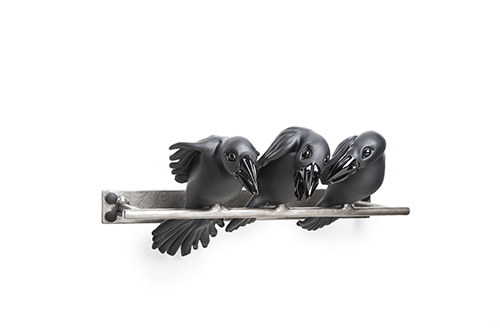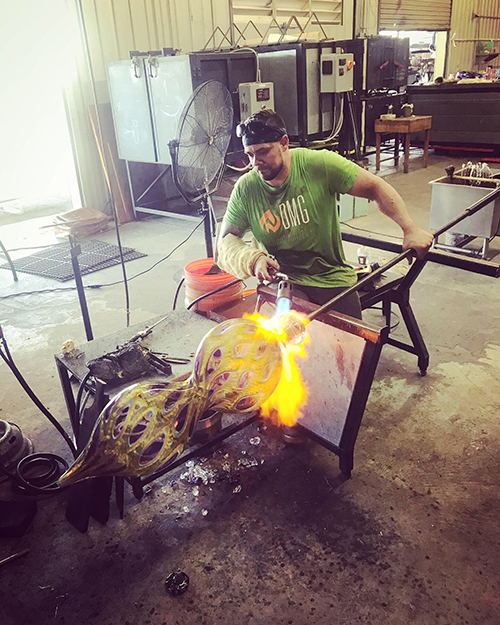In his professional career as a glassblower, Kent State University alumnus Dan Alexander has done a lot in the decade since graduating with a B.F.A. in Craft in 2010. From humble beginnings in the hot shop at Hale Farm and Village, he has since traveled the world as an educator and demonstrator for the Corning Museum of Glass, working with some of the best in the field along the way. With a body of work that varies widely in style and technique, ranging from functional vessels to large scale sculpture, Dan has found success in both the Craft and Fine Art worlds. He is currently serving as hotshop director for Third Degree Glass Factory in St. Louis, MO, while continuing his work as an educator at Washington University.

A: Working with a number of different professional artists, I think is one of the most important things for a young/emerging artist. You will see different approaches from designing, creating, finishing, and displaying professional quality work.
It is very beneficial to see these steps from multiple sources and develop a process that works for you. This information could save tons of hours of trial and error later. You will also be building a stronger C.V. and resume which will only add credibility to your name or brand. This will also improve your success rate on applications and shows.
Q: How important is educating the public when it comes to the art of glassblowing?
A: Education is an extremely important aspect. If the public wasn’t interested in art then many mediums would suffer. The more knowledge we can share with the public, the more sales, donations, and funding will be put into the arts.
Similar to critiques in a college atmosphere you will always be answering questions about your craft or medium throughout your whole career. Talking about art to the public is always great practice and will build confidence. Also like college critiques, it makes it a lot easier to have the answer to the question before it is asked.

Q: Has your time at Corning offered you any new insights into the art form?
A: My time at Corning was a big turning point for my craftsmanship and also glass as a material.
From a maker’s perspective, I was surrounded by some of the best glassblowers in the industry. The Museum was also bringing in artists from all over the world for lectures, demonstrations, and classes. I got a lot of exposure to different artists and styles of working.
I also worked in the same facility as the largest collection of historical glass and next to Corning Incorporated which created the Hubble Space Telescope, Pyrex, CorelIe, and the glass that is used for NASA’s space vehicles. During my time at Corning I grew a huge appreciation towards the history and science aspect of glass as a material.
Q: What special challenges are involved in blowing glass at sea? Where is your favorite place that your work has allowed you to travel?
A: When I worked on cruise ships for Corning, there were always a number of challenges that would come up. Being outside under awning, the climate could be a wildcard. I’ve worked on many islands throughout the Caribbean, sailed the Baltic from England to Iceland, went to almost every major port in the Mediterranean, and spent several months sailing from Australia to New Zealand.
You could imagine that all of these countries have extremely different climates. I’ve worked in extreme heat, hurricane storms, snow, rough seas… anytime the captain allowed the outdoor decks to be open, I worked. Blowing glass on land is a piece of cake now!

Q: Your work is very technical - do you feel that this has been the most important factor in your attaining the level of success which you have?
A: Yes, the technical aspect has helped my career greatly. Making hot glass requires multiple people with a certain skill set. I have received a number of jobs in the past because of a certain technique I am good at or that I am versatile and can make a wide range of different pieces. Any knowledge you can gain will only benefit your craft. It is very frustrating when you have a great idea but can not execute it like you planned.
When I was a student at Kent we were very fortunate to have a glass master from Italy come through with over 50 years of experience. The first day he had the students gather around the bench and said “I want to show everyone something I learned last week”. This was a huge motivation for me to keep pushing my craft and it was also a confirmation that there is always something you can improve on.

A: It is important to keep good communication with clients and galleries. That bond will only bring more sales and opportunities. I have clients I've sold pieces to 8 years ago that will still email me occasionally.
Collectors are not only investing in the piece of art they are about to purchase, they are also investing in the person who created the piece. A good portion of my commissions/sales come from word of mouth or recommendations from someone I made a piece for in the past.
Q: In what ways did your time at Kent best prepare you for your career as a glass artist?
A: Kent was a great experience for me. I was challenged to think outside the box and pushed to fulfill project requirements that I wouldn’t think of on my own.
Q: Do you have any advice for current art students?
A: Take as many opportunities as possible. If you want to be a professional artist as a living you will have to make sacrifices. Especially in the emerging artist stage. I credit some of the success I've had from bouncing around to wherever the work was at and working with a wide range of different artists. I would also recommend applying to as many shows,scholarships, and classes as possible. Even if you don’t think you will get it… Apply! Do not take your studio time in college for granted. It is a huge wake up when you are paying out of pocket to create your work.
Images: Artwork by Dan Alexander, Courtesy of the artist.